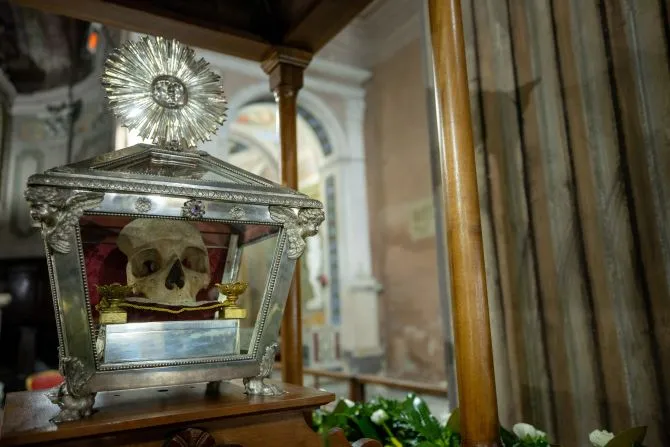“St. Thomas speaks, has spoken, and continues to speak to my heart in the few months I have been pastor of this church,” he said.
 Mass-goers honor St. Thomas Aquinas at the Priverno Co-cathedral of Santa Maria Annuziata on March 7, 2024. Credit: Daniel Ibanez/CNA
Mass-goers honor St. Thomas Aquinas at the Priverno Co-cathedral of Santa Maria Annuziata on March 7, 2024. Credit: Daniel Ibanez/CNA
“St. Thomas was part of my formation … because he was one of and is one of the greatest doctors of the Church,” the priest added. “What fascinates me about Thomas is how he leads us into the depths of the mystery of God with the simplicity of a child who always knows how to wonder.”
The procession and celebrations of Aquinas in Priverno are part of two years of jubilee celebrations of St. Thomas Aquinas by the Order of Preachers.
During the jubilee year, Catholics can obtain a plenary indulgence by making a pilgrimage to a holy site connected to the Dominican order to either take part in the jubilee celebrations or “at least devote a suitable time to pious recollection,” concluding by praying the Lord’s Prayer, reciting the Creed, and invoking the intercession of the Blessed Virgin Mary and St. Thomas Aquinas.
(Story continues below)
The Dominican order’s double jubilee year will conclude after the feast of St. Thomas Aquinas on Jan. 28, 2025, the 800th anniversary of Aquinas’ birth. Aquinas was born in 1225 in the Italian town of Roccasecca, about 75 miles southeast of Rome, which at the time was part of the Kingdom of Sicily.
Bishop Crociata of Latina-Terracina-Sezze-Priverno led the procession in Priverno following Mass to honor Aquinas in a packed cathedral with standing room only. At the conclusion of the procession, the relic was transported to Fossanova Abbey in the front seat of a Jeep.
 The purported skull of St. Thomas Aquinas is transported in a Jeep to Fossanova Abbey, March 7, 2024. Daniel Ibanez/CNA
The purported skull of St. Thomas Aquinas is transported in a Jeep to Fossanova Abbey, March 7, 2024. Daniel Ibanez/CNA
Vatican Secretary of State Cardinal Pietro Parolin will offer Mass in the presence of the Priverno relic on March 7 in Fossanova Abbey, where a conference is also being held on Aquinas and the natural law sponsored by the Pontifical Academy for the Social Sciences.
Pope Francis sent a message to the academics participating in the conference to mark the 750th anniversary.
“The Angelic Doctor was profoundly convinced that since God is the truth and the light that illumines all understanding, there can be no ultimate contradiction between revealed truth and the truths discovered by reason,” the pope wrote.
“Central to his understanding of the relationship of faith and reason was his conviction of the power of God’s gift of grace to heal human nature weakened by sin and to elevate the mind through participation in God’s own knowledge and love, and thereby to enable us to understand and correctly order our lives as individuals and in society.”
“Here, Thomas points out, we see the heart of the Christian life as an act of priestly worship aimed at the glorification of God and the sanctification of our world,” he added.
Courtney Mares is a Rome Correspondent for Catholic News Agency. A graduate of Harvard University, she has reported from news bureaus on three continents and was awarded the Gardner Fellowship for her work with North Korean refugees.
 The procession of the purported skull of St. Thomas Aquinas in Priverno, Italy, March 7, 2024. Credit: Daniel Ibanez/CNA
The procession of the purported skull of St. Thomas Aquinas in Priverno, Italy, March 7, 2024. Credit: Daniel Ibanez/CNA



 Father Alessandro Trani, the rector of the Priverno Co-cathedral of Santa Maria Annuziata. Credit: Daniel Ibanez/CNA
Father Alessandro Trani, the rector of the Priverno Co-cathedral of Santa Maria Annuziata. Credit: Daniel Ibanez/CNA
 Mass-goers honor St. Thomas Aquinas at the Priverno Co-cathedral of Santa Maria Annuziata on March 7, 2024. Credit: Daniel Ibanez/CNA
Mass-goers honor St. Thomas Aquinas at the Priverno Co-cathedral of Santa Maria Annuziata on March 7, 2024. Credit: Daniel Ibanez/CNA The purported skull of St. Thomas Aquinas is transported in a Jeep to Fossanova Abbey, March 7, 2024. Daniel Ibanez/CNA
The purported skull of St. Thomas Aquinas is transported in a Jeep to Fossanova Abbey, March 7, 2024. Daniel Ibanez/CNA


